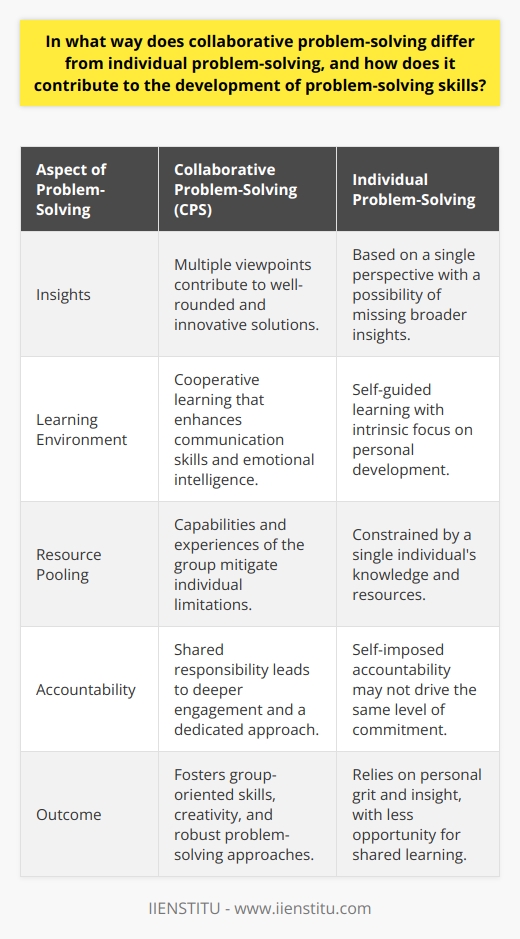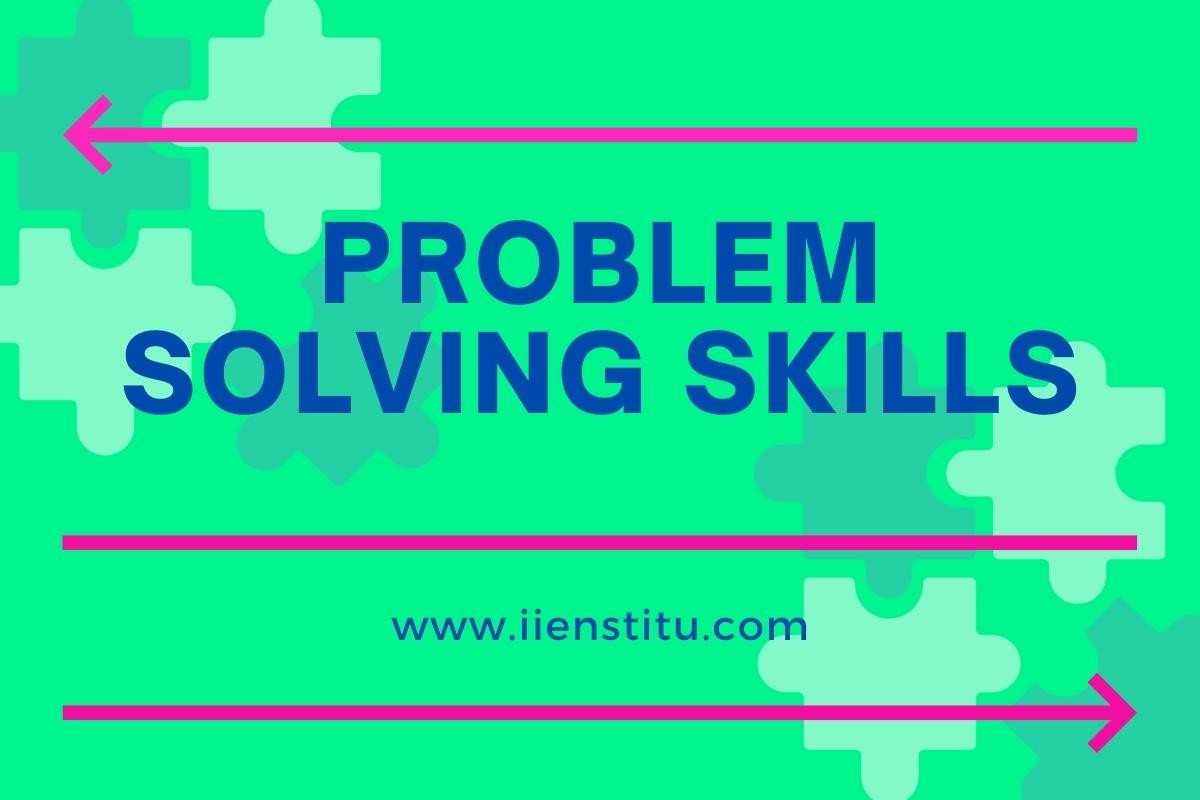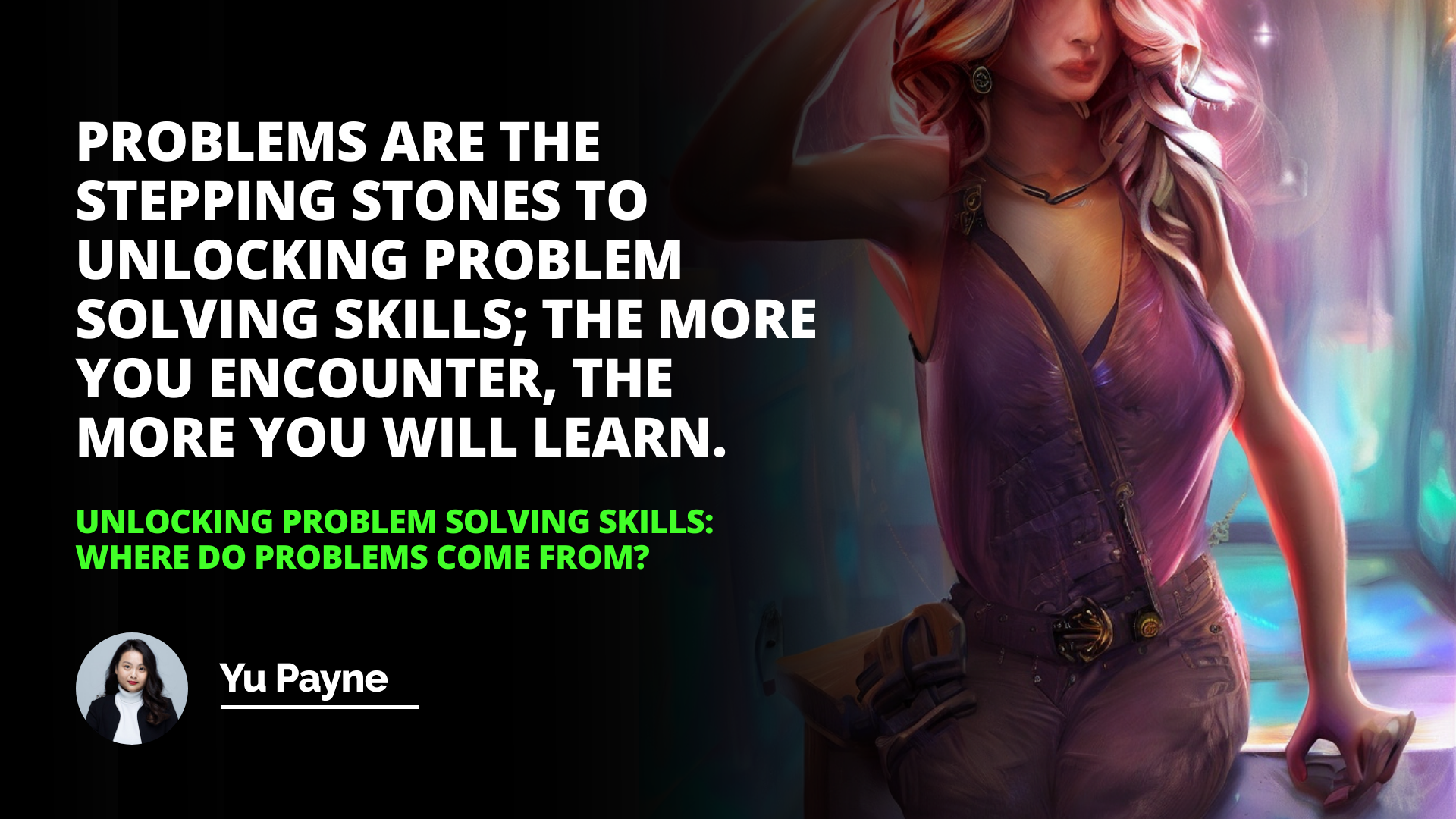
I still remember that day vividly, sitting in my high school chemistry lab, staring blankly at a complex equation on the blackboard. The swirls of letters and numbers seemed to dance mockingly before my eyes. My teacher, noticing my bewildered expression, walked over and said, "Every problem has a source, and understanding that source is the key to unlocking it." Over the years, those words have resonated with me, not just in academics but in every facet of life. Problem-solving is more than just a skill—it's an art, a crucial component of navigating the complexities of our world.
Introduction
What is a Presented Problem?
What is a Discovered Problem?
What is a Created Problem?
Conclusion
From juggling deadlines at work to figuring out how to fix a leaky faucet at home, the ability to solve problems efficiently and effectively is indispensable. But have you ever stopped to ponder where these problems come from? Are they always thrown at us by external forces, or do we sometimes uncover or even create them ourselves?
As Abraham Kaplan famously highlighted, "The formulation of a problem is often more essential than its solution." Understanding the source of a problem not only aids in finding a solution but also enhances our critical thinking and decision-making abilities. So, let's delve deeper into the origins of problems and discover how recognizing their sources can boost our problem-solving prowess.
What is a Presented Problem?
Imagine you're at work, sipping your morning coffee, when your manager drops by your desk. "We've got a situation," she says. "Our supplier shipments are getting delayed, and we need to optimize our supply chain management process tips ASAP." Suddenly, you're faced with a problem that has been handed directly to you—a classic example of a presented problem.
Presented problems are those that are given to us, often by someone in authority or by circumstances beyond our control. They are:
Assigned tasks from a teacher or boss.
What is Problem Solving? How to Do It? Step-by-Step Techniques
Quality Tools: Essential Techniques for Effective Decision-Making
Issue Tree Analysis: Breaking Down Complexities for Simplified Solutions
Unexpected issues like a flat tire on your way to an important meeting.
Client requests that require immediate attention.
These problems are typically well-defined, meaning that the nature of the problem and the desired outcome are clear. However, the path to the solution may not be immediately obvious.
Problems are the stepping stones to unlocking problem-solving skills; the more you encounter, the more you learn.
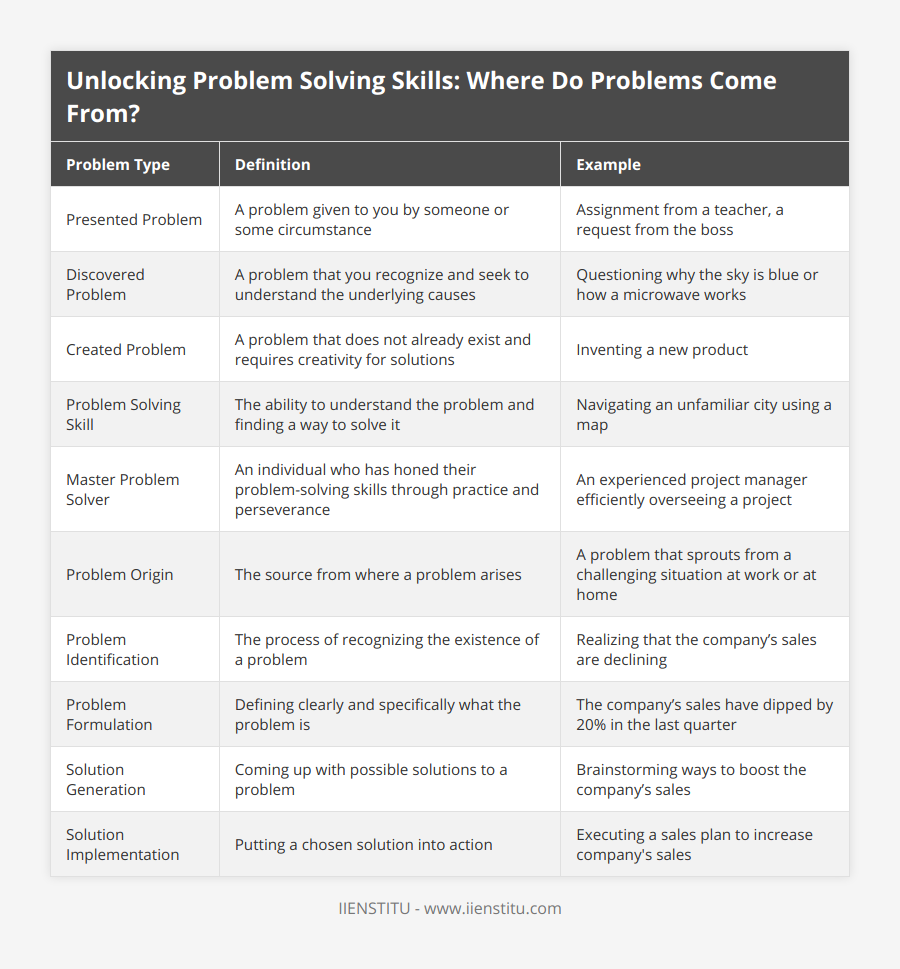
In my early days as a project manager, I often encountered presented problems that tested my decision-making and analysis skills. One memorable instance was when our team had to deliver a software update ahead of schedule due to a sudden market opportunity. The challenge was to coordinate among various departments, ensure quality, and meet the tight deadline.
To tackle presented problems effectively, it's essential to:
1- Fully understand the problem: Ask questions to clarify any uncertainties.
2- Assess available resources: Identify what tools, personnel, or information you have at your disposal.
3- Develop a plan of action: Break down the problem into manageable steps.
4- Communicate effectively: Keep all stakeholders informed to ensure alignment.
5- Monitor progress: Regularly check to ensure the solution is on track.
By honing our interpersonal skills and practicing effective communication, we can navigate presented problems with greater ease. After all, collaborating with others often leads to more innovative solutions.
What is a Discovered Problem?
Have you ever been strolling in the park, watching the autumn leaves fall, and suddenly wondered, "Why do leaves change color?" That moment of curiosity is the seed of a discovered problem.
Discovered problems arise from our own observations, questions, or intuitions. They are not presented to us explicitly but are unveiled through exploration and inquiry. Famous inventors and scientists often stumbled upon problems that no one else had noticed.
Take, for instance, Alexander Fleming's discovery of penicillin. Returning from a vacation, he noticed that a mold had contaminated his Petri dishes, and instead of discarding them, his critical thinking led him to ask why the bacteria around the mold were dead. This analysis sparked one of the most significant medical breakthroughs of the 20th century.
Discovered problems typically require:
Curiosity and open-mindedness: Being willing to see beyond the obvious.
Observational skills: Paying attention to details others might miss.
Goal development: Setting objectives based on newfound insights.
In my own career, I recall a time when, while crunching numbers late into the night (burning the midnight oil, as they say), I noticed a subtle but consistent dissatisfaction with a particular service feature. No one had complained outright, but the hints were there. Recognizing this as a discovered problem, I initiated a review and proposed enhancements. This proactive approach not only improved customer satisfaction but also showcased the importance of leveraging job skills like critical thinking and analysis in everyday work.
To cultivate the ability to discover problems:
Stay curious: Never stop asking "why" or "how."
Engage in active listening: Sometimes, the hints are in what others are saying.
Embrace lifelong learning: Continuously expanding your knowledge broadens your perspective.
Reflect regularly: Take time to ponder your experiences and observations.
Collaborate with others: Discussions can reveal insights you might have missed.
By embracing discovered problems, we open ourselves to innovation and professional development that can set us apart in our careers.
What is a Created Problem?
Now, let's venture into the realm of created problems, where creativity and innovation take center stage. These are problems that didn't exist until someone conceived them, often as a means to achieve progress or address potential future challenges.
Consider the visionary entrepreneur Elon Musk. Before Tesla, the electric vehicle market was virtually non-existent. Musk didn't just solve an existing problem; he created a problem by challenging the status quo of the automotive industry. By envisioning a world less dependent on fossil fuels, he set out to address the challenges of mass-producing electric cars, establishing charging infrastructure, and changing consumer perceptions.
Created problems are often the driving force behind:
Inventions and innovations: New products or services that revolutionize industries.
Artistic endeavors: Crafting a novel, composing music, or designing a building.
Strategic planning: Developing long-term plans to achieve ambitious goals.
In my own experience, when I decided to launch a side business offering consulting services, I faced a myriad of created problems. From identifying a niche market to developing a brand identity, each step required me to formulate challenges that needed solutions. This journey honed my communication skills, decision-making, and social skills as I navigated networking events, pitched to potential clients, and collaborated with partners.
To effectively tackle created problems:
1- Embrace creativity: Allow yourself to think outside the box.
2- Engage in goal development: Clearly define what you want to achieve.
3- Leverage interpersonal skills: Collaborate with others to bring your vision to life.
4- Anticipate challenges: Think ahead about potential obstacles.
5- Stay resilient: Persistence is key when facing uncharted territory.
Creating problems might sound like we're asking for trouble, but it's actually at the heart of innovation and progress. By intentionally formulating challenges, we push boundaries and drive change.
Strategies to Improve Problem-Solving Skills
Improving your problem-solving abilities doesn't happen overnight, but with consistent effort and the right approach, anyone can become adept at navigating challenges. Here are some practical tips to enhance your problem-solving skills:
1- Practice Mindfulness and Observation
Stay present: Mindfulness helps in becoming more aware of your surroundings and thoughts.
Observe patterns: Identifying recurring issues can lead to proactive solutions.
Journal regularly: Writing down your observations can clarify your thoughts.
2- Develop Strong Interpersonal Skills
Engage in active listening: Understanding others' perspectives can provide new insights.
Build relationships: Networking enhances your ability to collaborate on problem-solving.
Seek feedback: Constructive criticism can highlight areas for improvement.
3- Enhance Critical Thinking Abilities
Question assumptions: Don't take things at face value.
Analyze information: Break down complex data into understandable parts.
Use logic and reasoning: Apply systematic approaches to understand problems.
4- Improve Effective Communication
Articulate thoughts clearly: Be concise and to the point.
Adapt your communication style: Tailor your approach based on your audience.
Utilize visual aids: Diagrams and charts can simplify complex problems.
5- Set Clear Goals for Development
Define SMART goals: Specific, Measurable, Achievable, Relevant, Time-bound.
Monitor progress: Regularly review your advancement toward your goals.
Adjust as needed: Be flexible and willing to change your plans.
6- Embrace Continuous Professional Development
Attend workshops and seminars: Stay updated in your field.
Read extensively: Books, journals, and articles can provide new perspectives.
Learn from mentors: Seek guidance from experienced professionals.
By incorporating these strategies into your routine, you can enhance not only your problem-solving skills but also other job skills that are highly valued in the workplace.
Conclusion
As we've explored, understanding the source of a problem—whether it is presented, discovered, or created—is pivotal in determining the most effective approach to solving it. Each type of problem taps into different skill sets and mindsets, from leveraging our critical thinking in discovered problems to utilizing our creative energies in created problems.
Remember the words of Albert Einstein, "We cannot solve our problems with the same thinking we used when we created them." By recognizing where a problem originates, we can adapt our strategies and develop the appropriate job and skills needed to address it.
In our ever-changing world, the capacity to solve problems is more than just a professional asset; it's a life skill. Whether you're aiming to optimize supply chain management processes in a corporate setting or figuring out how to keep your indoor plants alive (trust me, I've been there), problem-solving enriches our experiences and broadens our horizons.
So, next time life throws you a curveball, or you stumble upon a head-scratcher, remember to pause and think about where the problem is coming from:
Is this problem being presented to me?
Have I discovered this problem through observation?
Am I creating this problem by envisioning a new future?
By doing so, you'll not only enhance your analysis skills but also foster effective communication and stronger interpersonal relationships. After all, problems are not obstacles—they're opportunities in disguise.
And as my high school chemistry teacher implied all those years ago, the key to unlocking any problem lies in understanding its source. So keep exploring, keep questioning, and above all, keep solving.
Problems are the stepping stones to mastering our problem-solving skills; the more you encounter, the more adept you become.
References
1- Kaplan, A. (1964). The Conduct of Inquiry: Methodology for Behavioral Science. San Francisco: Chandler Publishing Company.
2- Getzels, J. W. (1979). "Problem Finding: A Theoretical Note." Cognitive Science, 3(2), 167–172.
3- Einstein, A. (1954). Ideas and Opinions. New York: Crown Publishers.
4- Fleming, A. (1946). "Penicillin." Nobel Lecture. Stockholm: Nobel Prize Committee.
5- De Bono, E. (1970). Lateral Thinking: Creativity Step by Step. New York: Harper & Row.
6- Covey, S.R. (1989). The 7 Habits of Highly Effective People. New York: Simon & Schuster.
Frequently Asked Questions
What is the difference between a presented, discovered, and created problem?
To address any given issue effectively, problem-solving is a fundamental skill required in many areas of life. Therefore, understanding the difference between a presented, discovered, and created problem is essential to address any given issue effectively.
Presented problems are those that are explicitly listed or described. They require no analysis, only the applying appropriate skills or knowledge to solve—for example, a math question in which the problem and the desired answer are already provided.
Discovered problems are those that require analysis and synthesis of information. These problems are not explicitly stated but must be discerned through observation and evaluation of existing conditions. For example, determining the cause of a malfunctioning machine based on the symptoms that it is exhibiting.
Created problems are those that require the formulation of a problem statement, the development of possible solutions, and the selection of the most optimal solution. These problems are usually open-ended and require great creativity and innovation. For example, we are designing a new product that meets the needs of a target customer.
In conclusion, it is essential to understand the differences between presented, discovered, and created problems to address any given issue effectively. Depending on the situation, different problem-solving strategies may be required to achieve a successful outcome.
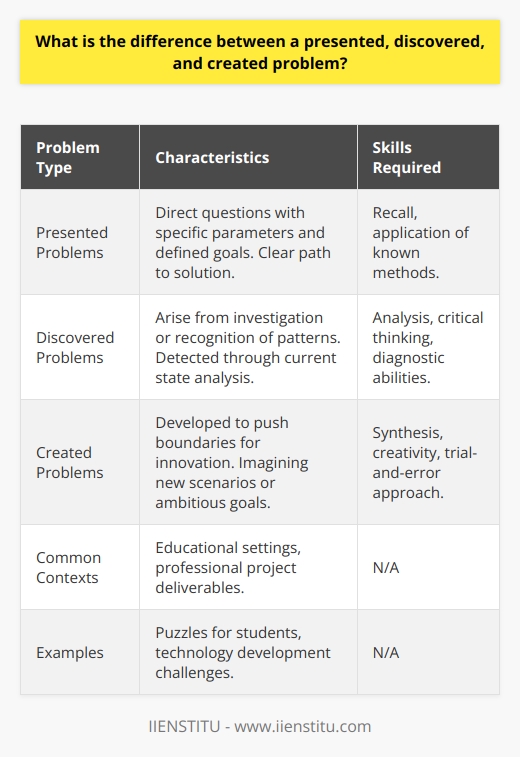
How can I develop my problem solving skills?
Problem-solving is essential in any field, but it can be difficult to develop if you’re unsure how to do it. This article will discuss developing problem-solving skills, including breaking down problems into manageable pieces, using the scientific method, and seeking out additional resources.
One of the first steps in developing problem-solving skills is to break down problems into smaller, manageable pieces. This will help identify the areas that need to be addressed to solve the problem. In addition, identifying any assumptions made about the situation is essential, and challenging them if necessary. This will help to ensure that the issue is being addressed correctly, problem-solving, and that a solution is being sought in the most effective way possible.
The scientific method can be a helpful tool for developing problem-solving skills. The scientific method is a process of experimentation and observation that can be used to identify solutions to problems. This involves forming hypotheses, testing them, and then looking at the results to make conclusions and develop solutions.
In addition to the methods discussed above, it can be helpful to seek out additional resources when developing problem-solving skills. This could include books, articles, and online resources related to problem-solving. It can also be beneficial to seek out advice from those who have experience in problem-solving, as well as to practice problem-solving in a variety of settings.
In conclusion, developing problem-solving skills can be complex, but it is possible with the right strategies. Breaking down problems into smaller, manageable pieces, using the scientific method, and seeking out additional resources can help develop problem-solving skills.
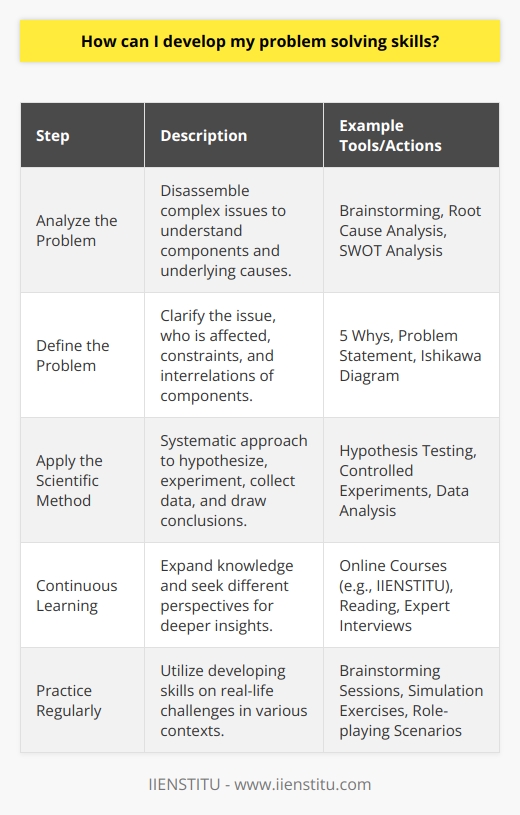
What strategies can I use to identify the source of a problem?
When it comes to problem-solving, identifying the source of the problem is often the most challenging part. It is impossible to find an effective solution without understanding the root cause of a problem. Fortunately, there are several strategies that ideas can help to identify the source of a problem.
The first strategy is to use the scientific method. This involves making observations, formulating hypotheses, testing the ideas, and analyzing the results. For example, if you are having trouble figuring out why the computer is not working, you could make observations about the computer’s performance, formulate hypotheses about what might be causing the issue, and test them.
The second strategy is to brainstorm potential sources of the problem. This involves brainstorming ideas about what might be causing the issue, then evaluating each statement to determine if it is a possible source of the problem. For example, if the computer is not working, you could brainstorm potential causes such as a virus, a hardware issue, or a software issue.
The third strategy is to consult an expert. If you cannot identify the source of a problem on your own, you may need to consult an expert in the field. For example, if the computer is not working, you could seek assistance from a computer technician. The technician may be able to provide insight into the root cause of the issue.
Finally, the fourth strategy is to use a combination of the above techniques. This involves combining the scientific method, brainstorming, and consulting an expert to identify the source of a problem. By taking a comprehensive approach, you are more likely to locate the start of the problem quickly and effectively.
In conclusion, identifying the source of a problem can be challenging. However, by using the strategies outlined here, you can significantly improve your chances of finding the root cause of the problem.
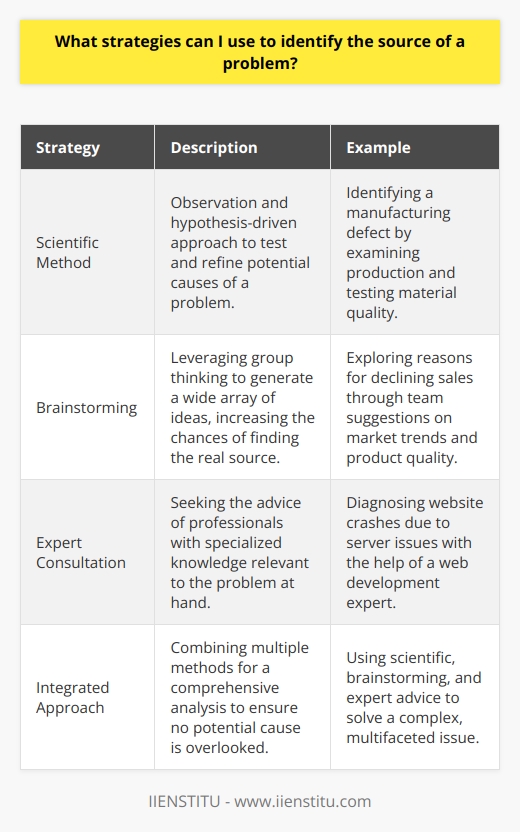
Where do you get problem-solving skills from?
Sources of Problem-Solving Skills
Problem-solving skills are essential for success in various aspects of life. These skills can be acquired and improved through various channels.
Formal Education
One primary source of developing problem-solving skills is through formal education, such as schools and colleges. Through a structured curriculum, learners encounter numerous problems at varying difficulties in subjects like mathematics, science, and languages, which help them enhance their critical thinking and analytical abilities.
Experiences and Observations
Life experiences and observations also contribute significantly to obtaining problem-solving skills. By encountering real-life situations and observing others tackle similar issues, individuals learn how to approach and solve problems in ways that are applicable to their unique circumstances.
Extra-Curricular Activities
Participation in extra-curricular activities, including sports, clubs, and competitions, can also foster problem-solving abilities. These activities often require teamwork and creative thinking to overcome challenges and achieve goals, which can help individuals develop their problem-solving competence.
Online Resources
In today's digital age, countless online resources, including tutorials, courses, and forums, can help individuals acquire and enhance problem-solving skills. By integrating these resources into their learning process, individuals can access diverse perspectives and techniques for addressing problems.
Mentors and Role Models
Having a mentor or role model in one's life can be an invaluable source of problem-solving skills. By observing and learning from those who have faced and overcome similar challenges, individuals can be inspired to adopt similar traits and strategies for their problem-solving toolkit.
Work Environment
The work environment often exposes individuals to new problems and challenges, pushing them to think critically and find effective solutions. Through tasks and projects that require resourcefulness, employees can develop their problem-solving skills while contributing to the success of the organization.
Conclusion
In conclusion, problem-solving skills can be obtained from various sources, including formal education, life experiences, extra-curricular activities, online resources, mentors, and the work environment. By engaging in diverse learning opportunities, individuals can consistently improve and refine their problem-solving abilities, ultimately leading to success in various aspects of their lives.
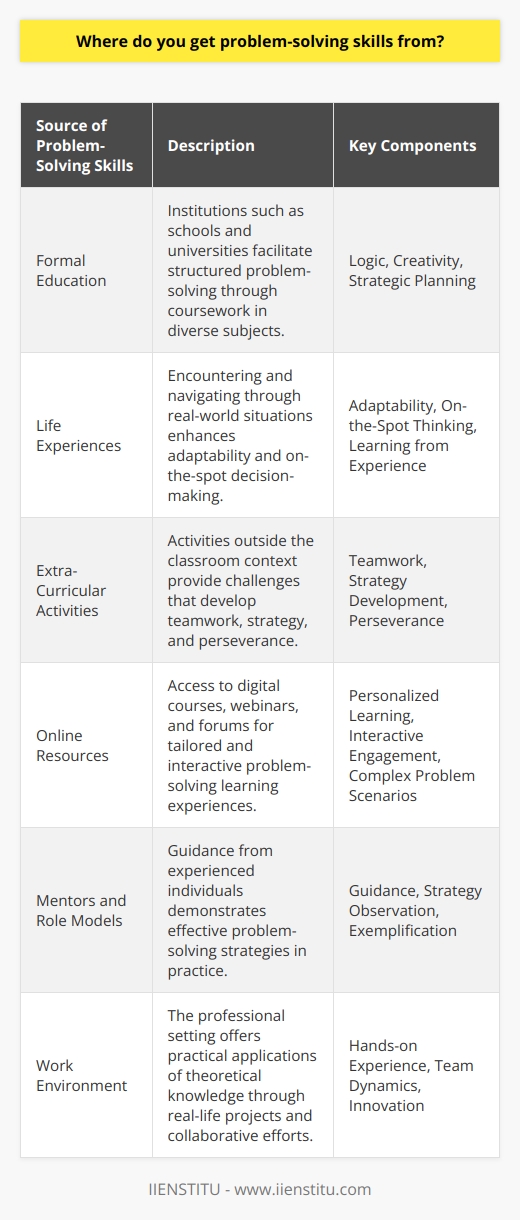
Why develop problem-solving skills?
Importance of Problem-Solving Skills
Developing problem-solving skills is essential for numerous reasons. Firstly, these skills facilitate critical thinking and foster better decision-making abilities. By analyzing complex situations rationally, individuals can arrive at informed conclusions, thereby maximizing the likelihood of favorable outcomes.
Enhancing Creativity and Adaptability
Problem-solving skills also enhance creativity, as they involve seeking innovative solutions to unforeseen challenges. A creative thinker is more likely to devise original and effective methods to address problems, thereby distinguishing themselves academically and professionally. Furthermore, these skills promote adaptability in a rapidly changing world, where future-proofing oneself against emerging problems is critical to personal success.
Fostering Teamwork and Communication
The development of problem-solving skills also fosters teamwork and effective communication. In many instances, problem-solving demands collaboration among individuals with diverse perspectives, necessitating clear and concise communication to reconcile various viewpoints. In the process, individuals develop valuable interpersonal skills that facilitate productive interactions within academic and professional spheres.
Boosting Confidence and Emotional Intelligence
Employing problem-solving skills can also foster confidence and emotional intelligence. As individuals develop their ability to tackle challenges, they become more confident in their abilities and their capacity to succeed. Moreover, the practice of problem-solving demands self-reflection and self-awareness, which are critical aspects of emotional intelligence. This heightened emotional awareness enables individuals to manage their emotions more effectively, both internally and in their interactions with others.
Preparing for Employment and Beyond
Finally, problem-solving skills are increasingly sought after in the job market, as employers recognize the value of employees who can adapt to new challenges and devise innovative solutions. By cultivating these abilities, individuals can enhance their employability and career prospects, ultimately contributing to their overall success and satisfaction. Furthermore, these skills extend beyond professional settings, helping individuals navigate the complexities of everyday life and improving their overall quality of life.
In conclusion, the development of problem-solving skills is critical for academic success, professional growth, effective communication, and personal fulfillment. By fostering these skills, individuals can adequately prepare themselves to confront the challenges of the modern world and succeed in their respective endeavours.
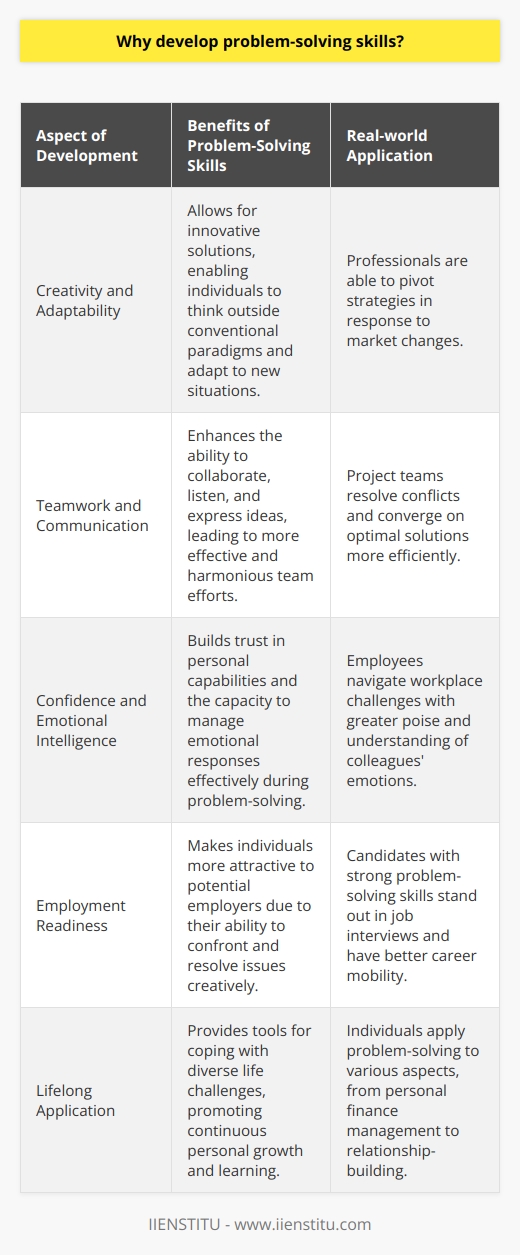
Are problem-solving skills innate?
Problem-solving skills as innate traits
The question of whether problem-solving skills are innate or acquired has long been a topic of interest in academic and educational circles. This debate encompasses different aspects of human intelligence, cognitive ability, and the learning process.
Nature vs nurture in problem-solving
Although there are strong arguments supporting the notion that problem-solving skills are primarily innate, it is crucial to acknowledge the influential role of the environment and experiences in nurturing these abilities. Genetic factors provide a foundation for individual differences in problem-solving skills, but cannot solely account for the development of such skills.
The role of experience and learning
Learning opportunities, educational environments, and personal experiences greatly influence a person's ability to solve problems. Access to diverse situations and exposure to various problem-solving approaches allow individuals to hone their skills and adapt to unique challenges. These aspects reinforce the idea that problem-solving skills are not exclusively innate, but also developed and perfected over time.
Cognitive processes in problem-solving
Problem-solving abilities are closely connected to an individual's cognitive processes, such as attention, memory, and executive functioning. Though genetic predispositions may shape these processes, these cognitive functions can also be trained and enhanced through specific intervention and practice. Consequently, this relationship suggests that problem-solving skills are not entirely innate.
The impact of motivation and mindset
An often-overlooked factor in the development of problem-solving skills is the role of motivation and mindset. An individual's belief in their ability to solve problems and tackle challenges can dramatically affect the success of their problem-solving endeavors. Thus, fostering a positive mindset towards problem-solving can lead to more effective and efficient use of innate abilities.
In conclusion, while there may be an inherent component to problem-solving skills, these abilities are significantly influenced by environmental factors, personal experiences, cognitive processes, and motivation. It is evident that problem-solving skills develop as a result of a complex interplay between genetic predispositions and external stimuli, making it difficult to claim that these skills are exclusively innate.
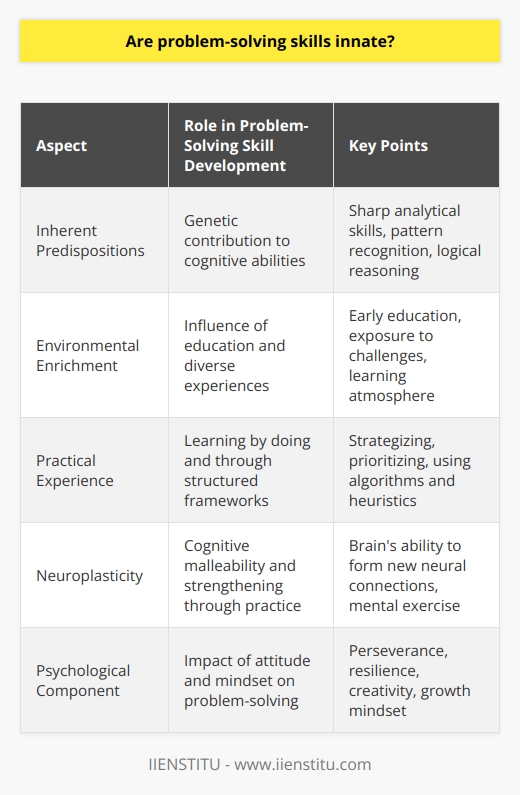
What are the three key components of problem-solving skills?
Three Key Components of Problem-Solving Skills
Defining the Problem
The first component of problem-solving skills involves identifying the issue to be resolved. By carefully analyzing the scenario and recognizing any underlying patterns or trends, one can form an accurate understanding of the problem at hand. This clear definition assists in selecting appropriate strategies to tackle the issue.
Generating Alternative Solutions
The second component of problem-solving skills involves brainstorming various solutions. It is essential to explore a wide range of possible answers, as it can encourage creativity and lead to innovative results. Evaluating the advantages and disadvantages of each alternative allows for a more informed decision on which strategy to pursue.
Implementing the Chosen Solution
The third component of problem-solving skills pertains to executing the chosen solution efficiently. This implementation requires forethought and planning to ensure that the chosen solution aligns with the given constraints and resources. Monitoring the outcome of the implemented solution is crucial, as it allows for adjustments and improvements.
In conclusion, effective problem-solving skills can be broken down into three core components: defining the problem, generating alternative solutions, and implementing the chosen solution. By mastering these elements, individuals can navigate through complex challenges and make well-informed decisions when faced with difficult situations.
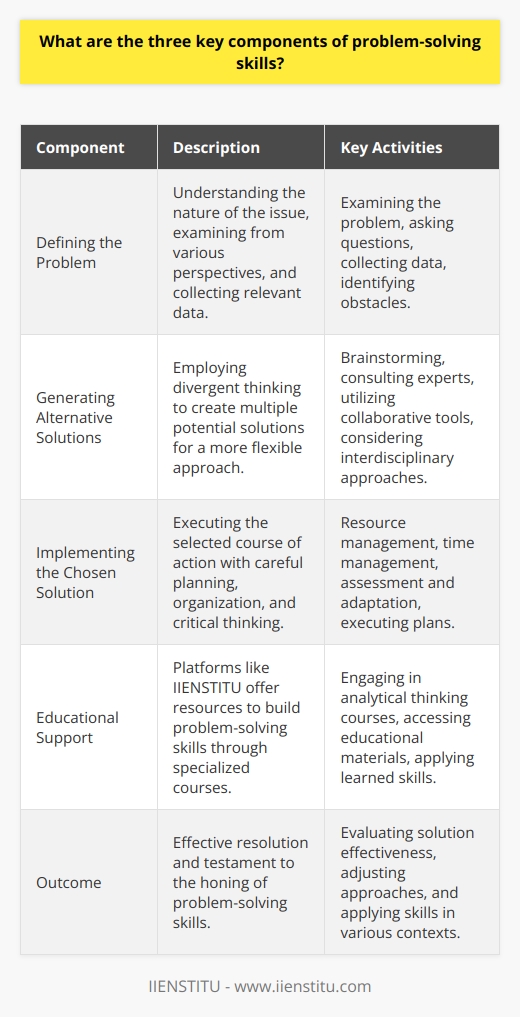
How can different cognitive processes contribute to effective problem-solving?
Cognitive Processes in Problem-Solving
Effective problem-solving requires individuals to engage in various cognitive processes. These cognitive processes involve a range of mental activities, from perceiving new information to adapting previous knowledge for use in solving novel problems.
Perception in Problem-Solving
Perception is the first cognitive process, enabling individuals to recognize problems that require resolution. Accurate perception of problems helps individuals to identify their specific aspects and focus on relevant information, leading to a targeted approach in solving them.
Attention and Focus
Successful problem-solvers must allocate their attention and focus appropriately in handling specific problems. This helps to filter out irrelevant information and minimize cognitive overload, allowing individuals to concentrate on relevant aspects of the problem and facilitate their problem-solving process.
Memory in Problem-Solving
Another critical cognitive process involved in problem-solving is memory. An individual's ability to access stored knowledge and past experiences plays a significant role in generating viable solutions for problems. Memory aids in connecting new information with previously learned concepts, facilitating the development of strategies and generating potential solutions.
Meta-Cognition in Problem-Solving
Meta-cognition, or the ability to think about one's thinking, is crucial in problem-solving. Individuals must analyze and evaluate their thought processes and problem-solving strategies to determine their effectiveness. This allows for self-regulation and adjustment of strategies, leading to more effective problem-solving outcomes.
Creativity for Effective Solutions
To generate innovative and effective solutions, individuals should engage in creative thinking. This cognitive process involves the ability to think beyond conventional methods and explore alternative possibilities. Creativity plays a crucial role in generating diverse ideas and strategies, eventually leading to successful problem resolution.
Integration of Cognitive Processes
Finally, effective problem-solving is an integration of various cognitive processes, which enables individuals to adaptively manage complex problems. The combination of perception, attention, memory, meta-cognition, and creativity allows individuals to develop and execute successful problem-solving strategies. Through this integration, individuals can effectively address challenges, adapt to new situations, and generate innovative solutions in their personal and professional domains.
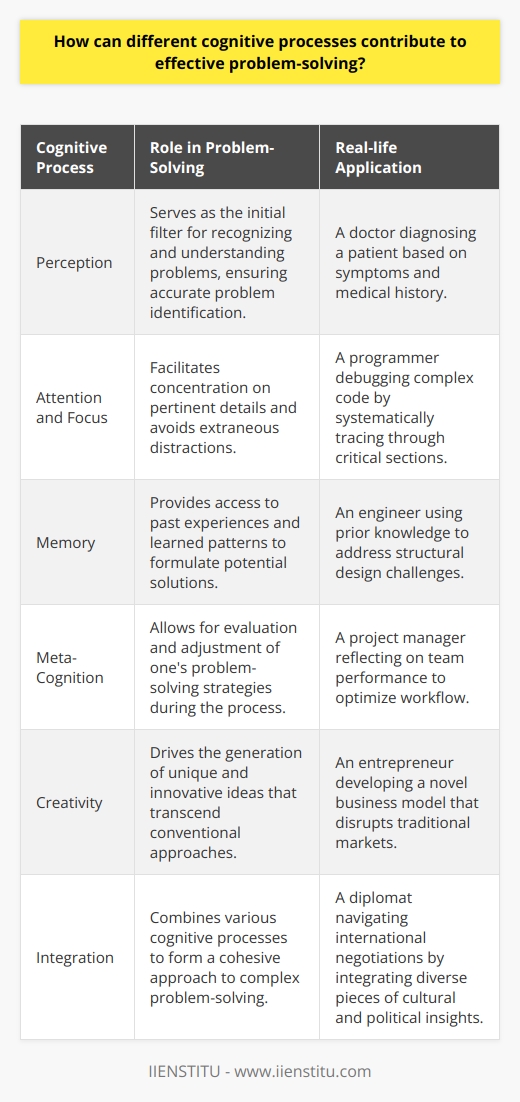
In what ways can an individual's environment and experiences influence their problem-solving abilities?
Impact of Surroundings on Problem-Solving Abilities
An individual's environment plays a crucial role in shaping their problem-solving skills. The surrounding individuals, accessibility to resources, and stimulation provided by the environment all contribute to one's ability to tackle problems effectively.
Role of Social Interactions
Interactions with family, friends, and mentors significantly affect one's problem-solving abilities. Through discussions and shared experiences, individuals learn different perspectives and strategies to approach various issues. These exchanges broaden an individual's mental framework, enhancing their capacity to devise creative solutions.
Influence of Resource Availability
The availability of resources such as books, technology, and access to educational programs profoundly impact problem-solving capabilities. Exposure to diverse information sources stimulates cognitive development, which in turn, leads to better problem-solving capabilities. Furthermore, sufficient resources provide opportunities for individuals to practice their skills, refine their thought process, and gain confidence in tackling complex problems.
Role of Challenging Situations
Encountering challenging situations fosters problem-solving abilities as individuals learn to adapt and overcome adversities. Dealing with such circumstances, individuals develop resilience and learn to identify patterns and connections between seemingly unrelated variables, which ultimately improves their problem-solving tactics. Thus, a nurturing environment enriched with intellectual challenges and divergent perspectives contributes to strong problem-solving capabilities.
Cultural Factors and Problem-Solving
An individual's cultural background also plays a role in influencing the way they solve problems. Different cultures have varying approaches to dealing with issues that arise. Understanding and being open to these diverse perspectives and building empathy can influence one's problem-solving skills positively.
Conclusion
In conclusion, it is evident that an individual's environment and experiences play a substantial role in shaping their problem-solving abilities. Encounters with varying contexts, availability of varied resources, and interactions with diverse individuals enable the individual to develop a solid foundation for effective problem-solving techniques.
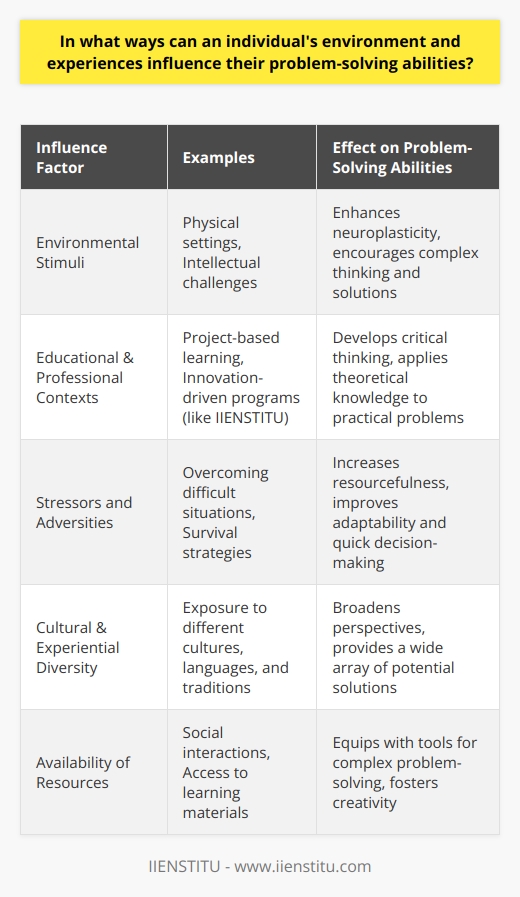
What factors contribute to the development of problem-solving skills in individuals?
Cognitive Abilities and Experience
A range of factors contribute to the development of problem-solving skills in individuals, with cognitive abilities and personal experience playing significant roles. Cognitive abilities, including intelligence and creativity, serve as a foundation for problem-solving. High intelligence correlates with advanced problem-solving skills, while creativity enables individuals to generate unique solutions for novel problems.
Problem-solving Strategies and Heuristics
The acquisition of problem-solving strategies and heuristics further fosters skill development. Successful problem-solving entails strategies like breaking down complex problems into smaller, manageable components; focusing on relevant information; and identifying patterns. Possessing a mental repository of heuristics, or shortcuts, can aid in making quicker, more informed judgments.
Metacognition and Self-regulation
Metacognition, or the awareness of one's cognitive processes, also plays an essential part. Proficient problem-solvers monitor and regulate their thought processes, frequently reflecting on their performance and adjusting their strategies accordingly. By engaging in metacognitive processes, individuals can learn from their successes and failures, thereby refining their problem-solving skills over time.
Social Interaction and Collaboration
Social interaction and collaboration provide opportunities for individuals to learn problem-solving skills from others. By working collaboratively, individuals can observe and adopt different approaches, engage in constructive discussions, and learn from diverse perspectives. Collaboration fosters a supportive environment in which individuals can transfer knowledge and skills, thus enhancing their problem-solving abilities.
Educational Practices
Finally, educational practices are crucial in promoting the development of problem-solving skills. Instructional methods that emphasize critical thinking, reasoning, and active learning help build a foundation for problem-solving. Furthermore, teachers who guide students through the process of problem-solving, rather than merely providing solutions, can foster independent and resilient thinkers.
In conclusion, a combination of cognitive abilities, experience, strategic approaches, metacognition, social interaction, and effective educational practices contribute to the development of problem-solving skills in individuals. Being aware of these factors can inform strategies to further enhance these vital skills, fostering more adept problem-solvers and successful individuals.
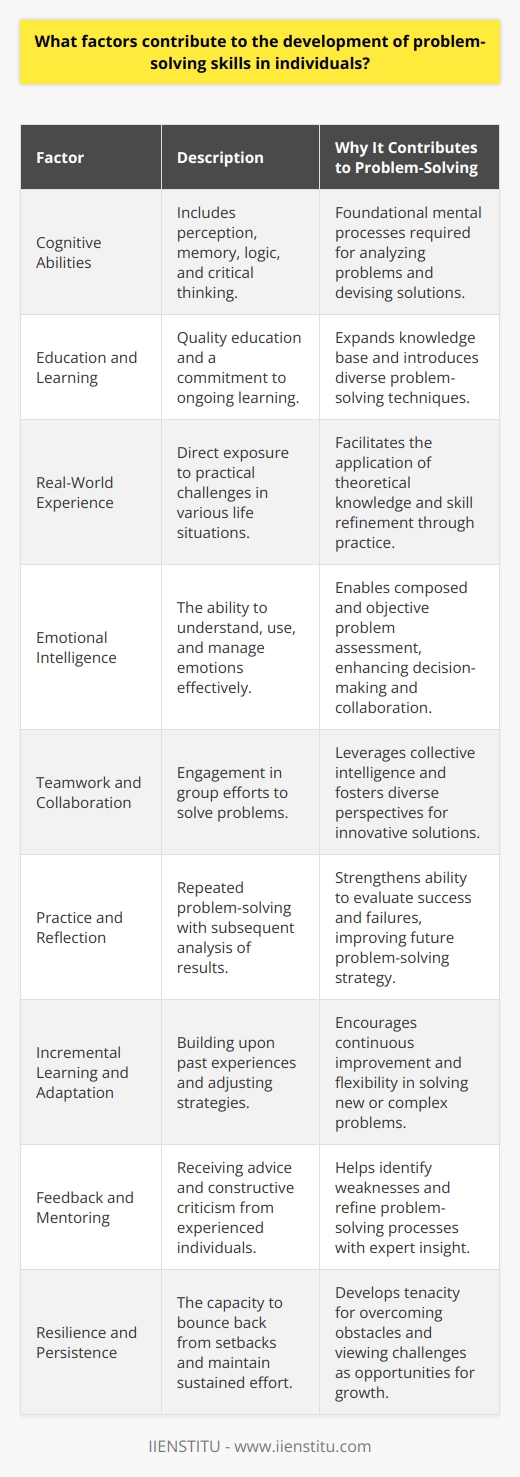
To what extent do various domain-specific knowledge and skills facilitate problem-solving in different disciplines?
Domain-Specific Knowledge and Problem-Solving
Understanding a variety of domain-specific knowledge and skills is crucial in facilitating problem-solving across different disciplines. The more equipped individuals are with these relevant, specialized abilities, the better they can adapt to and resolve various situations.
Role of Domain-Specific Knowledge
Domain-specific knowledge forms the foundation for problem-solving. In each discipline, its relevant knowledge is essential for grasping the particularities, mechanisms, and techniques required to perform accurately and efficiently. For example, a chemist needs to understand chemical reactions and molecular structures, while an economist must be familiar with supply and demand principles. Thus, the depth of domain-specific knowledge directly impacts one's problem-solving capabilities.
Skills Development in Different Disciplines
Developing specialized skills is a significant factor in addressing issues within different disciplines effectively. A wide range of intellectual and practical abilities is necessary for navigating diverse challenges, such as critical thinking, data analysis, creative expression, and technical proficiency. Moreover, expertise in interpersonal, teamwork, and communication skills is critical to ensuring a collaborative and successful problem-solving process.
Interdisciplinary Approaches to Problem-Solving
While domain-specific knowledge and skills are essential, interdisciplinary approaches to problem-solving can yield even more robust solutions. The integration of multiple disciplines often exposes new perspectives, insights, and ideas that a single-domain approach may overlook. Consequently, the ability to draw from various domain-specific skills and knowledge sources enables individuals to engage in innovative problem-solving that spans disciplinary boundaries.
In conclusion, possessing a diverse range of domain-specific knowledge and skills is not only essential for problem-solving but also promotes adaptability and innovation across various disciplines. By focusing on developing these competencies and recognizing the significance of interdisciplinary approaches, individuals can better solve complex problems and contribute to the advancement of their respective fields.
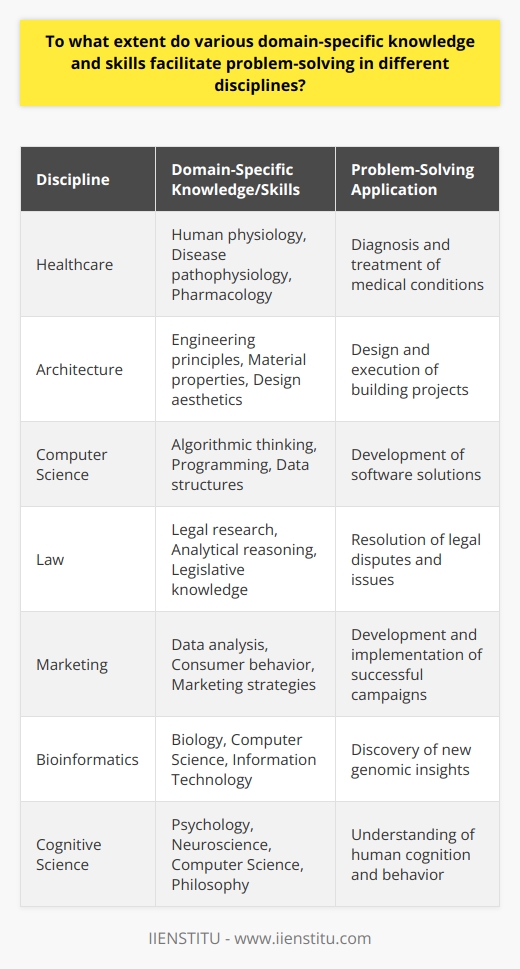
How do metacognitive strategies enhance one's problem-solving abilities?
Metacognition and Problem-Solving
Metacognitive strategies play a vital role in enhancing one's problem-solving abilities by fostering self-awareness, reflection, and effective planning. Metacognition involves the process of 'thinking about thinking,' enabling individuals to analyze their cognitive processes and develop a deeper understanding of their learning styles and capabilities.
Developing Self-Awareness
A primary aspect of metacognitive strategies is the development of self-awareness, which involves understanding one's strengths and weaknesses in problem-solving. By acknowledging their individual preferences and tendencies, learners can tailor their problem-solving approach in a way that best suits their cognitive profile. This customization enables more effective and efficient problem-solving.
Reflecting on Problem-Solving
Metacognitive strategies encourage individuals to reflect upon their problem-solving processes. This reflection promotes the identification of potential areas for improvement and fosters the adjustment of future problem-solving approaches. By evaluating their thought processes and decision-making, individuals can become more adept at navigating complex problems and reaching successful outcomes.
Effective Planning and Goal Setting
Metacognitive strategies also contribute to enhancing problem-solving abilities by promoting effective planning and goal setting. By developing a well-organized plan of action before tackling a problem, individuals can streamline their cognitive efforts and maintain focus on the necessary steps to reach their desired goal. This premeditated approach minimizes distractions and unproductive efforts, ultimately leading to improved problem-solving abilities.
Monitoring Progress and Adjusting Strategies
Through the use of metacognitive strategies, learners can monitor their progress towards solving a problem and adjust their strategies accordingly. By staying aware of their progress and actively reassessing their approach, individuals can adapt to unforeseen challenges or changing circumstances. This ability to make strategic adjustments is crucial for successful problem-solving.
In conclusion, metacognitive strategies hold immense potential in enhancing one's problem-solving abilities by promoting self-awareness, reflection, effective planning, goal setting, and progress monitoring. By actively engaging with their cognitive processes, individuals can optimize their problem-solving strategies and improve their overall learning experiences.
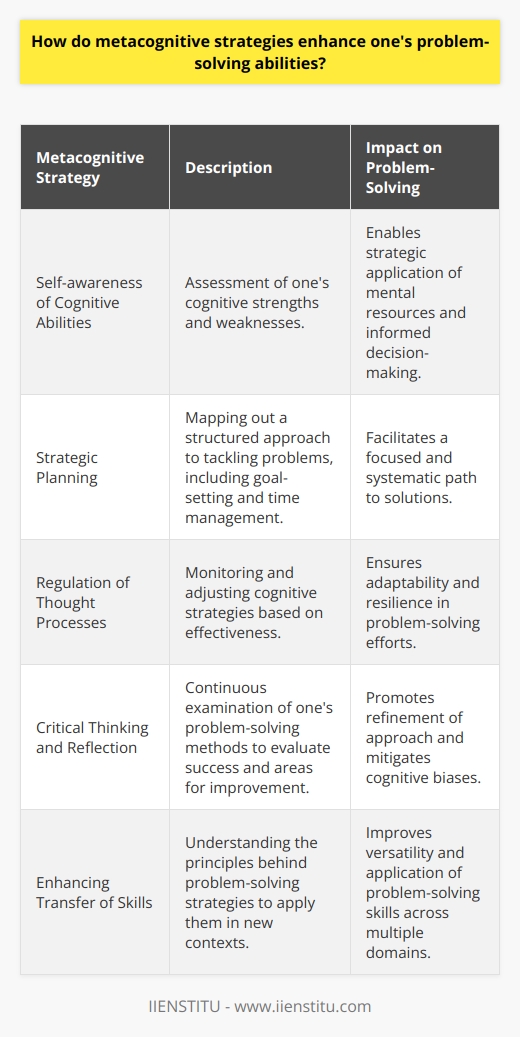
What factors contribute to difficulties with problem-solving?
Cognitive Factors
Problem-solving difficulties stem primarily from cognitive factors, such as inadequate cognitive processing or poor metacognitive skills. Inadequate cognitive processing arises when individuals lack essential knowledge, cognitive structures, or processing skills to successfully solve a problem. For instance, limited comprehension abilities or spatial reasoning hinder one's ability to derive an effective solution. In addition, poor metacognition—the ability to think about and monitor one's own thinking—can impede effective problem-solving.
Emotional Factors
Emotions also play a significant role in problem-solving difficulties. High levels of stress or anxiety can impair a person's cognitive processes, inhibiting their capacity to think critically and creatively. Moreover, intense emotions, whether positive or negative, can reduce focus and concentration, affecting the ability to assess various potential solutions.
Motivational Factors
A lack of motivation can also lead to difficulties in problem-solving. Individuals who lack self-confidence and are not intrinsically motivated to address a problem may approach it with a defeatist attitude, believing they lack the skills to solve it effectively. This mindset can deter them from putting forth adequate effort, and consequently, they become less likely to derive a solution.
Socio-Cultural Factors
Socio-cultural factors are another contributor to problem-solving difficulties. Our upbringing, culture, and personal experiences shape our unique worldview, limiting how we perceive and tackle problems. A potential solution might not be considered if it conflicts with an individual's socio-cultural values. This narrow perspective can impede the ability to find an effective resolution.
External Factors
Lastly, external factors can influence problem-solving difficulties. Time constraints, lack of resources, and excessive workload can negatively affect an individual’s ability to address problems adequately. The absence of tools or information can also hinder problem-solving success, leading to frustration and inadequate solutions.
In conclusion, various factors contribute to difficulties in problem-solving. Cognitive factors and metacognitive skills are crucial, as they directly impact an individual's ability to process and understand problems. Emotional and motivational factors determine an individual's approach and commitment to addressing problems, while socio-cultural factors shape how problems are perceived and tackled. Finally, external factors can pose challenges that exacerbate problem-solving difficulties. Therefore, addressing these factors is essential for improving individuals' ability to solve problems effectively.
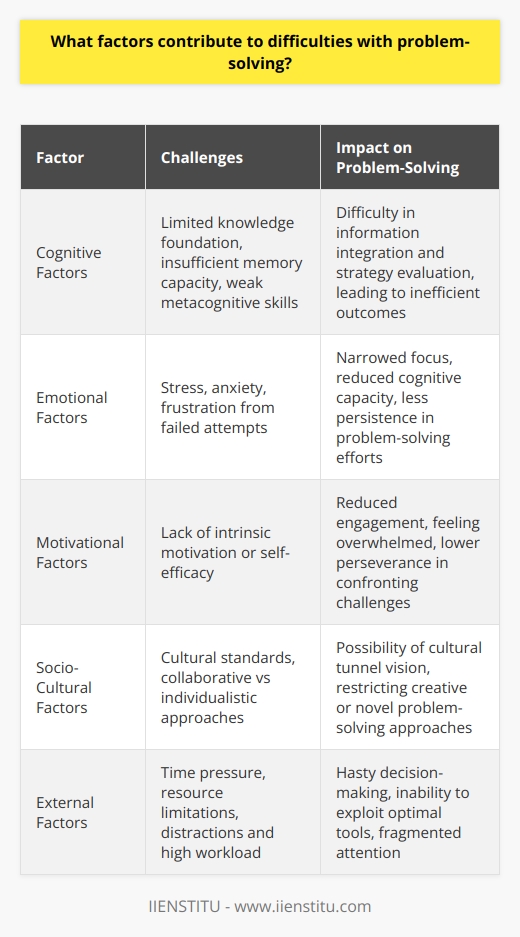
How do individual differences, such as cognitive style and personality, impact problem-solving effectiveness?
Individual Differences and Problem-Solving Effectiveness
Cognitive Style Effects
Cognitive style, an individual's preferred way of processing information, influences problem-solving effectiveness. People with a more analytical cognitive style tend to break down problems into smaller parts and analyze each separately. This approach may lead to successful outcomes when addressing complex issues. On the other hand, individuals with a more intuitive cognitive style rely on prior experiences and gut feelings. This strategy can be effective in situations requiring quick decisions, but may lead to errors when dealing with intricate problems. Consequently, cognitive style affects the strategies employed, and hence, impacts the effectiveness of problem-solving.
Personality Factors
Personality factors, too, play a significant role in problem-solving effectiveness. Openness to experience, a central trait in the Big Five personality theory, is linked to creativity and divergent thinking. Individuals high in openness tend to generate novel and diverse ideas when solving problems, enhancing the likelihood of finding effective solutions. Conversely, those low in openness may struggle in situations that require innovative thinking.
Conscientiousness and Persistence
Another key personality trait affecting problem-solving abilities is conscientiousness. Highly conscientious individuals are often disciplined, organized, and persistent. They are more likely to work systematically, pay attention to details, and persevere when faced with challenges. This persistence can lead to increased effectiveness in discovering solutions. On the contrary, those lacking conscientiousness may neglect details and abandon problem-solving tasks prematurely, thus lowering their chances of success.
Emotional Intelligence
Emotional intelligence (EI), an essential component of individual differences, also impacts problem-solving effectiveness. Individuals with high EI can recognize and regulate their emotions and the emotions of others, enabling them to make informed, rational decisions. When confronted with obstacles, high-EI individuals can maintain composure and adopt effective coping strategies. In contrast, low-EI individuals may struggle with emotion regulation and decision-making, hindering their ability to solve problems successfully.
In conclusion, several individual differences – cognitive style, personality, and emotional intelligence – significantly influence problem-solving effectiveness. Understanding these differences can help individuals and organizations tailor problem-solving approaches and enhance the likelihood of achieving desired outcomes.
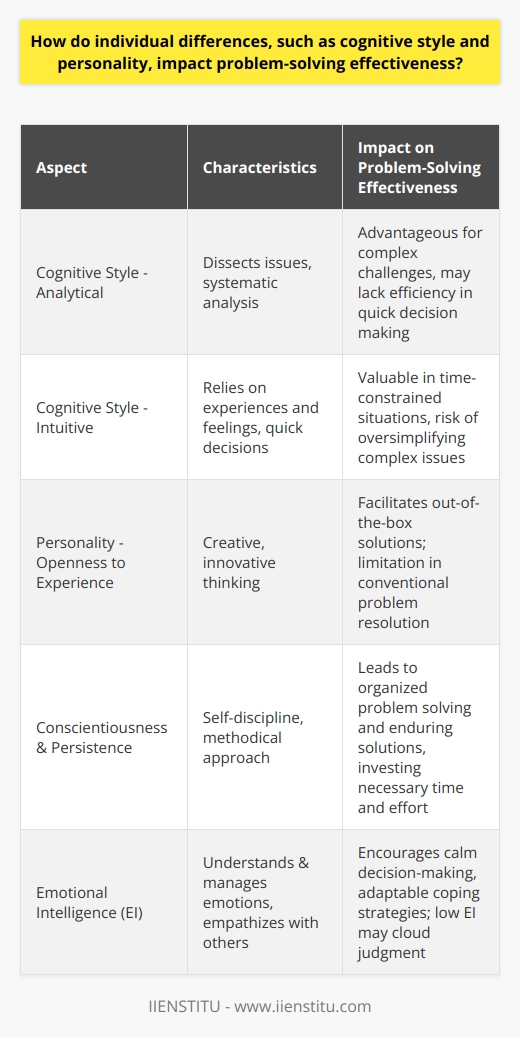
In what way does collaborative problem-solving differ from individual problem-solving, and how does it contribute to the development of problem-solving skills?
Distinct Approaches to Problem-Solving
Collaborative problem-solving and individual problem-solving differ significantly in their approach to resolving issues. The former involves a group of individuals working together to analyze, propose, and generate solutions. Conversely, individual problem-solving relies solely on one person's abilities, knowledge, and experience to address a problem. Both methods serve specific purposes; however, collaborative problem-solving offers unique benefits in the development of problem-solving skills.
Diversity of Perspectives
One key advantage of collaborative problem-solving lies in the diversity of perspectives presented. Multiple individuals from various backgrounds contribute their expertise, ideas, and viewpoints to generate innovative and creative solutions. In contrast, individual problem-solving might yield limited or biased conclusions due to the solitary nature of the process. Moreover, this diversity of perspectives encourages individuals to think critically and engage in constructive debates, which is crucial for skill development.
Cooperative Learning
Collaborative problem-solving fosters cooperative learning, as individuals must work together towards a common goal. Cooperation necessitates effective communication, active listening, and open-mindedness to understand others' perspectives. These interactions enhance individuals' social and emotional skills, alongside problem-solving abilities. On the other hand, individual problem-solving does not present opportunities for such interpersonal growth, potentially hindering skill development.
Shared Resources and Expertise
Another advantage of collaborative problem-solving is access to shared resources, including knowledge, experiences, and skills. Participation in a group allows individuals to learn from one another by observing different approaches and techniques. Consequently, collaborative problem-solving promotes continuous learning and the expansion of problem-solving skills through shared expertise. While individual problem-solving can promote learning through experience, it may lack the richness and complexity that collaboration brings.
Collective Responsibility
Lastly, collaborative problem-solving instills a sense of collective responsibility among group members. This responsibility leads individuals to be more accountable for their contributions and encourages active participation in problem-solving processes. As a result, collaborative problem-solving consistently challenges individuals and helps them grow their problem-solving capacities. Conversely, individual problem-solving may not provide the same level of accountability or motivation for continuous skill development.
In conclusion, collaborative problem-solving significantly differs from individual problem-solving in its approach and the benefits it offers for skill development. Collaboration allows for the exploration of diverse perspectives, cooperative learning, access to shared resources and expertise, and instills a sense of collective responsibility. These aspects collectively contribute to the growth and development of problem-solving skills, which might be limited in individual problem-solving scenarios.
